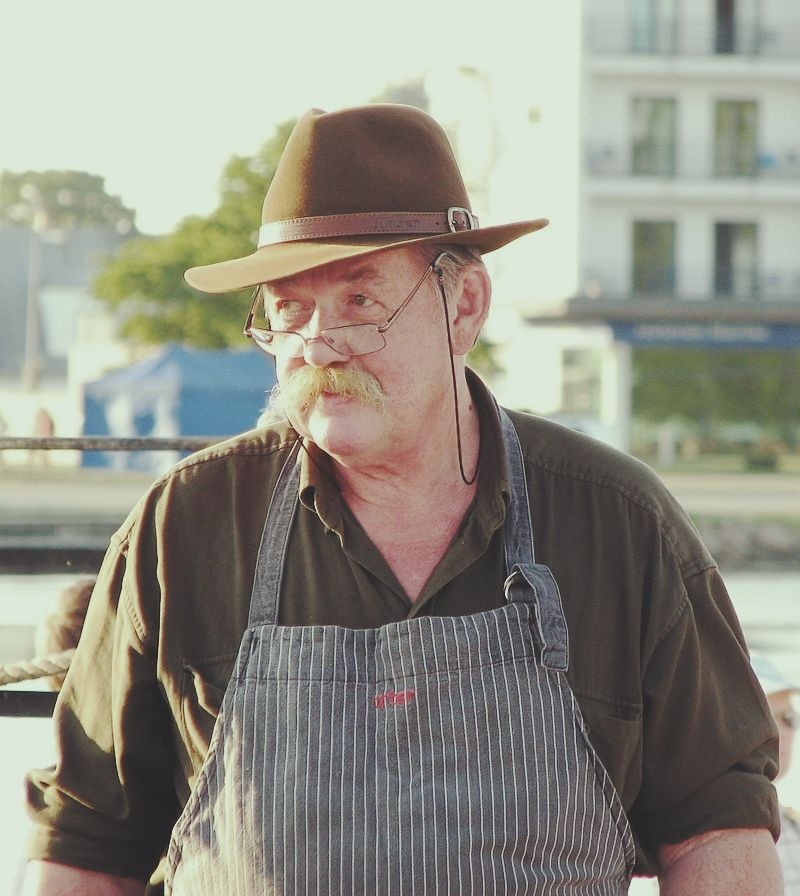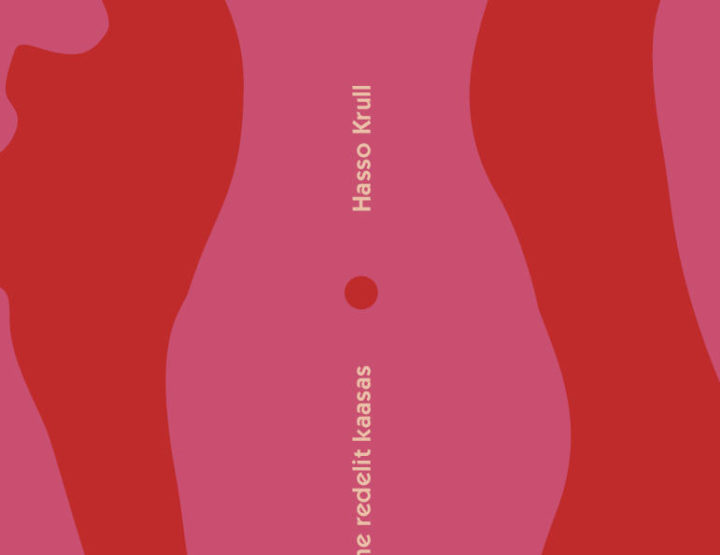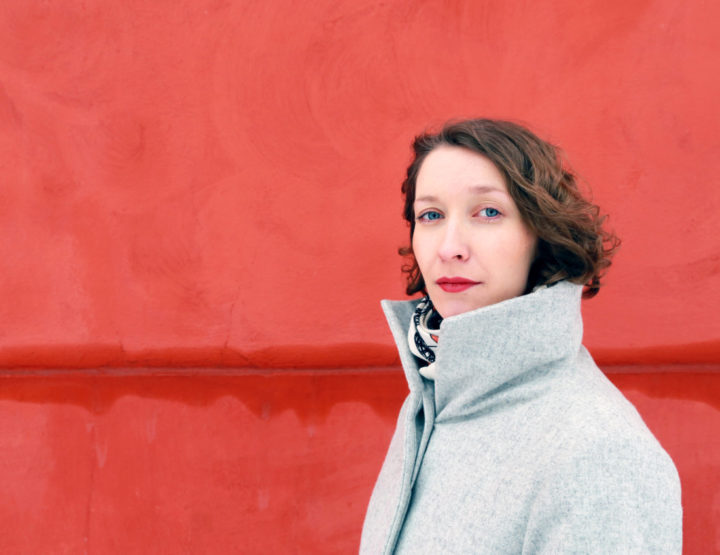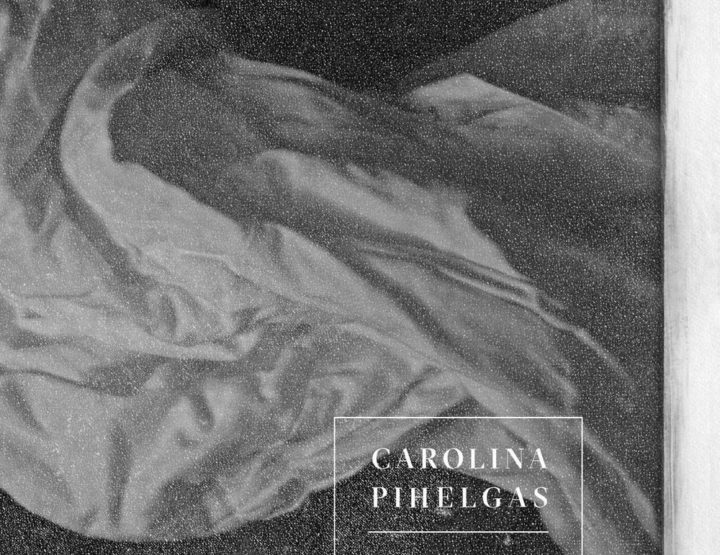Vladislav Koržets (1951) is a long-time celebrity Estonian writer and fisherman, whose poetry debut Songs or Such (Laulud või nii) appeared at long last in 2016. The collection immediately won the Cultural Endowment of Estonia’s Award for Poetry, and rightfully so. But does Koržets view himself as a poet, too? He is a chef, restaurant owner, fisherman, humorist, and all-around artist and thinker… He has mainly written books about fish and fishing, but has also penned a children’s book, a few film scripts and plays, lyrics, and jokes. On top of that, he is the editor of a comedy magazine and a fishing magazine. So, Koržets and I sat on the patio of his Kalambuur Café one late spring afternoon, and tried to figure these things out.
How is it that you came to publish your first poetry collection only now? You’ve always had ties to literature and people have always known that you’re a poet, so it’s strange to think that this is your first book of poetry… even many of your friends are poets. Why didn’t you do it earlier?
There are many reasons. One is that I’ve been rather inept at putting books together over the years … as far as literature is concerned. I haven’t assembled my short stories to this day. My whole life, I’ve felt that putting a book together isn’t important at all. What’s important is what I’m going to write today or tomorrow. Finished work and its exhibition somewhere haven’t appealed to me.
Another reason is probably that, just like many other people, I began trying out literature with poems: the sort of gloomy, melancholy poems of youth that are brimming with ache, just like it is for… kids in late puberty?
Does puberty ever really end for a poet?
Not necessarily. Speaking on my own behalf, I’ve had the gumption to say that I went straight from puberty into a mid-life crisis, into, to a certain extent, an attitude towards life that was even irresponsible and failed to appreciate certain values, that looked past some values, which might’ve even included traditional things like work, family, home, and what all… although I was both a work and family person. But those are all just slightly secondary at some point. That’s the curse of being a writer: you start regarding your creativity and work as the most important things in the world. I got over that relatively quickly, thankfully. It was all somewhat clear by sometime in my 30s. I started being able to distinguish between myself and my creative works. Those are two separate things that shouldn’t be mixed.
I’m still struggling with that.
It’s sort of an inner thing, oftentimes… After a certain point, I didn’t write poems anymore, of course. That was also because I happened to exist in the same generation, in the same time, as some very strong poetic personalities. The Juhan Viiding/Jüri Üdi phenomenon was strong and outstanding back then, and he tended to overshadow others, naturally. I’m not talking only about myself, but about several other wonderful, talented writers of that generation. By the way, it’s worth noting that Üdi/Viiding also took things from them; he took things from me: just like any proper writer, he had sort of a thief’s ear. Which I can’t blame him for. At the same time, the liveliness and strength of his personality, as well as the way he used literary devices influenced everyone, including me.
So, when I – as a young, twenty-or-so-year-old man – first tried publishing my poems, I didn’t get very far. Back then, publishing was troublesome in general and there weren’t many opportunities – just a few magazines you could count on one hand, the ones that people read, ones it was worth submitting your stuff to where there’d be any prestige. I suppose I hadn’t developed my own poetic language or posture yet, either. I was crouching, searching for myself, writing free verse to a certain extent: very associative and emotional poetry. And I wrote quite a lot, and there’s very little of it left, because generally it all went into the fireplace.
If you want to run well, then you’ve got to run with the best. Is it the same rule in poetry, or do talents suffocate one another, as you say?
Toomas Kall[1] put it really well when I received the award for my book recently: “Think of how good it is that you didn’t compile your first collection at the age of 17 or 18 – you’d be awfully embarrassed today!” There’s a grain of truth in that. It might indeed be a good thing that I wasn’t able to start regarding myself as a substantial poet. I took the path where doors opened for me. And they opened in the field of comedy writing. They opened very smoothly, and all on their own. What was the point of me breaking through a closed door? And poetry was somewhat of a closed door for me.
I opened other doors, too: dramaturgy, radio dramas, scriptwriting, short stories: I’ve tried writing something longer as well, but it hasn’t worked out yet. Maybe I don’t have the pluck for it or the maturity or… I took breaks from plays by writing children’s stories. Or vice versa. And I still wrote a few occasional poems.
For a while, I used my poetic abilities to write parodic and travesty-style odes that have never been published. I performed them live, but their content makes them unfit to print.
Do you still have them?
I do. They weren’t suitable for Songs and Such: I wrote them with a different kind of sense and purpose. They’re too doggerel-ish, though they are in ode form. “An Ode to the Soviet Circus”, “An Ode to the Falling Night”. I even wrote them to order, opened up my own ode workshop. They’re basically humoresques in verse.
Every good poet should be a little bit of a humorist: otherwise, it’s just a halo dangling over a void, holy light drowning out the poetry…
It’s understandable that humor is a method of survival. Since we’re given a fear of mortality to bear from birth, then we’re given a sense of humor to balance it out. It’s a strange combination. If you don’t have a sense of humor, then that fear of mortality and the solemnity of the world will suffocate you.
You tend to apologize for your poems a little: Songs or Such…
True. And wholly on purpose. I’m set apart from contemporary poetry’s mainstream, almost with a school-like poetic method, with a schoolkid’s strict pursuit of rhyme and structure. I respect the good poets – ranging from Talvik to Alliksaar, Runnel, and Rummo – and when I read their poetry, I’ve just got to say “…or such” about myself.
I’m not burdened by the weight of being a poet. My very good late friend Ott Arder said a poet never works, but a poet is always working. The role of being a poet is also a burden.
But Koržets’ “role” exists, also: you’re a media figure and have created a kind of poetic ego. You’ve got to have that protective layer sometimes.
Unfortunately so, but several years ago I realized that in order to reach one’s true self, you sometimes have to let go of yourself, and by that I mean those very roles, classifications, iconizing; otherwise, the roles will kill you. That’s why I fiercely rejected my role as a humorist once, discontinuing it and ceasing to perform. At one point, I gave up my fishing magazine. I’ve had other disavowals, and hopefully, there’ll be more. In order for the image of my ego to stay clear, I’ve got to occasionally wipe away what exists.
What’s it like to melt into someone else’s skin while writing?
Writing really can be done in many different ways: whether deeply as yourself, or playing some role, transforming into someone else. That’s how I wrote the lyrics for the film Farts of Fury[2], where I was even given the song titles in advance: “Pig and Cuckoo” and “Steppenwolf’s Howl”! Those were really enjoyable to write.
That’s great; those songs were the best part of the film!
There was another song in it, the idea for which I had earlier: “Slaves of Freedom”. It’s a thought, an image, which describes many of my good friends. The fear of life or of an activity is draped in it: wanting to be free under any circumstances… And then, you’re made a slave to your freedom: that’s how it is with lots of people. No obligations or anything, and real life just starts to flow past.
Maybe the reason why I waited so long with this book is that I was waiting to be mature. I matured so slowly; maybe now, I’m mature enough that what I have to say somehow concerns others as well.
Maturity, ripening, is a culinary process… how do you as a connoisseur view today’s life through food imagery? Hipsters are all going vegetarian, the world has changed, ethics have been made a part of food culture, and for some, it’s awful to think that you, an old fisherman, rip out fish guts.
Well, those are meta-problems. I can still remember the turbulent transitional period of the 80s and 90s: it was a very difficult time to get by, to survive, since petrol and food were in short supply. And then, you read in the newspaper about how animal protectionists were fighting fur-wearers in Sweden. I could tell clearly that it was a pseudo-problem. Good welfare turned people into idiots: I’ve got a poem that ends like that, too. When someone lacks difficult problems, then he’ll come up with them on his own. But the fact that those problems exist today… they’ve actually been around this whole time. We still are living mentally in the Middle Ages, for the most part. And it’s getting even more Middle-Aged in some respects, especially for people who lack direct, daily contact with nature, who lack an ancient reality, a primary existence. The world we occupy, urban space is secondary. There’s human-made culture, human-made problems, and all kinds of urban work that includes virtual space. There’s hardly any contact with that which is bigger and mightier than we are: with the thing called nature. And then there’s hardly any of that particular wisdom, either. That’s when people start thinking that killing a fish is cruel. Ah, how cruel nature is!
In our culture, at least, people have a strong desire to be right, to be more right than others: about nutrition, for example. And the lack of education is also a problem: the scarcity of classic, systematic education. If a person hasn’t had to exercise his brain, if he’s worked thoroughly through some philosophical systems and then put them aside, then he lacks critical training. He’s dumber than Descartes, who said to doubt everything. Then, he might fall into the clutches of almost any kind of seemingly scientific conception. Scientific nature is like a flag or a breaker: we use it without understanding what science really is, and how little it actually knows.
How do you view contemporary poetry, Estonian poetry? Is it also a kind of degenerate part of secondary urban culture?
That’s hard to answer. I’m not very up to date on, or in the scene. But you’re right: these days, people talk about a thing called prose poetry, which for me, isn’t actual poetry anymore. I believe that one may write those kinds of pieces, but for me, it’s disrespecting poetry. I’ve written a few myself as well, and have even used that kind of language in my humoresques. Break the words up into short lines, and you’ve got poetry. There was a fierce struggle going on for free verse during my younger days; for giving it the right to live. I can’t help being enchanted by stricter form. Unfortunately, I have to admit that those ancient talents who are on a par with Viiding – especially the ones who sprout from urban culture – appear relatively rarely. Not that they really can, of course; even if there are just a few over the course of a century, then that’s already great for a little country like Estonia.
I accept and respect people who strive to find themselves through words, i.e. poetry as a journey of self-discovery, as a path to something. But for my experience of myself, to also touch others: does that ever happen? Speaking from personal experience, I can say that becoming simple isn’t very simple. It’s scary to be simple, and scary to be genuine, too, you know. We elevate genuineness to a motto, saying we’ve got to be sincere and all, but we’re afraid. It’s like everything else in the world: 80–90% of everything that’s done is junk, and it won’t stand the test of time. Are my poems junk, too? I don’t know. I’m not troubled by whether I’ll still be read or not in a hundred years. Seeing as how most of what’s written disappears, I should be thankful that I’m able to arrive at something within myself through poems and meter… to arrive at recognition. I feel like meter is meant to bind messy thoughts together – to try to attain some clarity out of the mess that everyone possesses.
Is it worse to place chaos in a mold of chaos? Its structuring is intellectual work, isn’t it?
One thing that I’ve craved is a sort of chill state of mind. I haven’t been able to word it differently: chill.
Have you experienced it?
Yes, sometimes.
Has it happened more while writing poetry or fishing, or while standing at the stove?
It’s happened in a variety of different mental states and situations, but yes, I’ve also occasionally reached that kind of chill and lightness – that perception – while writing poetry. The world becomes somehow lucid and dear to me at some point, and it feels good to be a part of it.
A few days ago, I realized that it’s possible to express very precisely in Estonian all those “modern” teachings – presence and the here-and-now – that are important for perceiving what’s around you. Tibetan Buddhism and meditation methods and the like. It’s ridiculously easy to say in Estonian, in four words; we’ve got the mantra: Siin ma nüüd olen![3] The question is whether I myself am here, too, or am I floating and wandering through all those issues? I’d like to be here!
[1] An Estonian dramaturg, humorist, and journalist – JR
[2] Kormoranid ehk nahkpükse ei pesta, 2011 – an Estonian film about aging rock stars. – JR
[3] Here I am now!
Jürgen Rooste (1979) is a poet, journalist, and one of the most renowned Estonian writers of his generation. He has published fifteen poetry collections and received the Cultural Endowment of Estonia’s Award for Poetry on two occasions, among many other literary awards.





